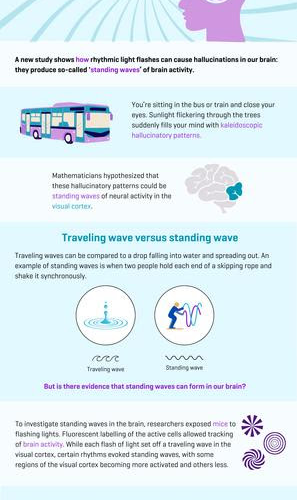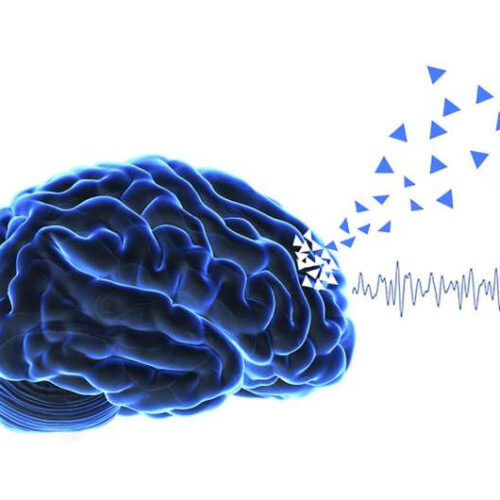News Release 10-Sep-2024 Peer-Reviewed PublicationNetherlands Institute for Neuroscience – KNAW image: Infographic hallucinations Credit: Eline Feenstra – Netherlands Institute for Neuroscience A new study from the Netherlands Institute for Neuroscience shows how flickering light can cause hallucinations in our brain: it produces ‘standing waves’ of brain activity. You’re sitting on the bus or train and...
Tag: <span>hallucinations</span>
Presence hallucinations: An early predictor of cognitive decline in Parkinson’s disease
by Ecole Polytechnique Federale de Lausanne Early hallucinations in Parkinson’s disease are associated with frontal cognitive decline (triangles), and preceded by specific frontal neural oscillation (theta frequency band). Credit: EPFL / Bernasconi. Have you ever felt the strong sensation that someone is behind you, so intense that you turn around, only to see that no-one is...
Antidepressant Psychedelics With No Hallucinations May Finally Be Possible
HEALTH 06 June 2023 By FELICITY NELSON (Jun/Getty Images) Researchers have recently shown that separate mechanisms drive the hallucinogenic and antidepressant effects of psychedelics like LSD and psilocin, potentially paving the way to use these ‘party drugs’ as treatments that don’t trigger psychedelic trips. “The antidepressant and plasticity-promoting effects of psychedelics may be dissociable from their hallucinogenic effects,” the researchers write...
Parkinson’s Disease: Focus on Hallucinations
Marine Cygler January 23, 2023 PARIS ― Hallucinations affect more than half of patients with Parkinson’s disease. They are often hidden by those experiencing them, yet they are something neurologists must be made aware of in their patients, since they are associated with poor long-term outcomes and a reduced quality of life. Hallucinations also are a source of...
What to know about Parkinson’s hallucinations
Parkinson’s disease most commonly causes tremors, stiffness, and difficulties moving, but the condition can also cause hallucinations. Hallucinations affect the senses and can result in people seeing, hearing, feeling, smelling, and tasting things that are not real. Up to 40% of people with Parkinson’s disease experience hallucinations or delusions, and this number increases as the condition progresses....
Psychologists create first-ever body-maps of hallucinations
by University of Leicester Credit: Pixabay/CC0 Public Domain University of Leicester psychologists have, for the first time, created body-maps of the sensations that arise during hallucinations in people experiencing psychosis. The study, published in The Lancet’s EClinicalMedicine, provides the most extensive descriptive data to date on the feelings that arise during hallucinations and where individuals reported...
Hallucinations: What explains these tricks of the mind?
Hallucinations are sensory perceptions that appear in the absence of stimuli. Although they are often associated with illnesses such as schizophrenia, these phenomena can occur in the absence of mental ill health. But what explains these uncanny occurrences? Not all hallucinations occur due to psychotic disorders or psychedelic drugs. There are many types of hallucinations....
Hallucinations in people with seizures may point to suicide risk
Researchers from Trinity College Dublin and the Royal College of Surgeons in Ireland (RCSI) have shown for the first time, the mental health significance of hallucinations in people with a history of seizures. In a study published today (Thursday, June 11th, 2020), findings show that 8% of individuals with a history of seizures report hallucinations,...
Scientists discover why Parkinson’s sufferers like Robin Williams may suffer hallucinations
Parkinson’s patients with hallucinations have disconnections between more areas of their brains than Parkinson’s patients without hallucinations The additional disconnections are between areas of the brain controlling the ability to process visual information and to pay attention MRI scans could help doctors detect increased disconnections that may lead to hallucinations in Parkinson’s patients These new...
How hard is it to recognise that you are experiencing a delusion?
When people experience delusions or hallucinations there is usually some loss of contact with reality whereby normal processes of thought and perception are disturbed. As humans, we are all susceptible to experiencing anomalous mental states such as this. In everyday life, for example, mentally healthy people distort reality to enhance their self-esteem and maintain beliefs about...






